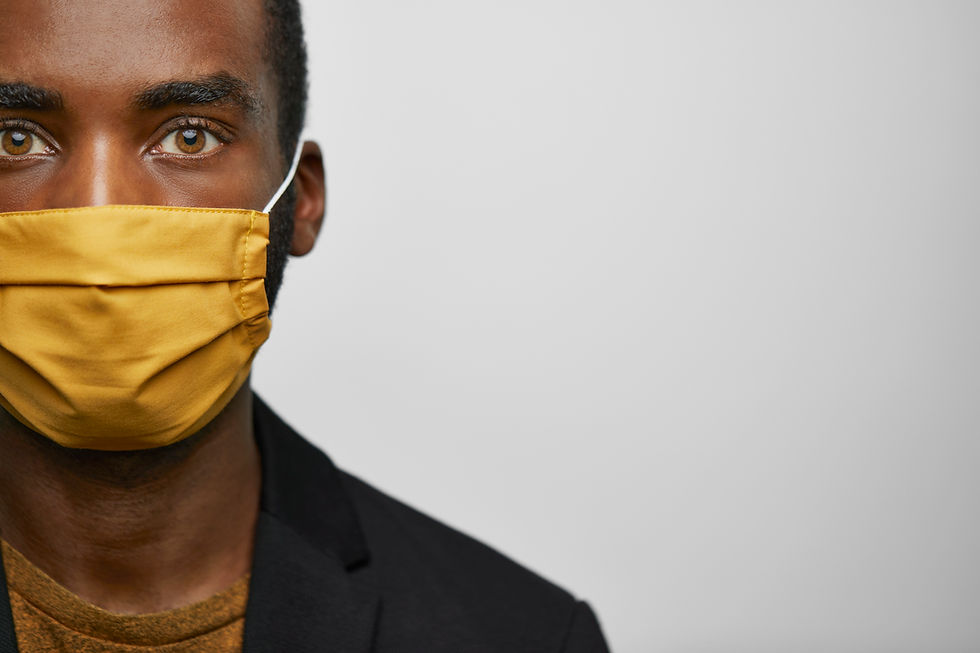Reflections from the Black & Covid Syllabus
- Dr. Tré Watkins

- May 15, 2024
- 4 min read

Global pandemic or not, Black people experience mortality, wealth, housing, education, the criminal justice system, and pretty much every other American institution or system with disproportionately worse results than everyone else. And as a few of the featured writers in the syllabus remind us:
“When America catches cold, Black folks catch pneumonia.”
When it comes to COVID-19, the public response directly blamed Black people for the outcomes, claiming it was our ignorance or unwillingness to adhere to social distancing recommendations that were the problem. Blame also came from those who meant well. These criticisms typically acknowledge that structural issues are the root cause of health disparities but then follow with a lecture about personal responsibility. An excellent example of this approach is the recent speech on Black health outcomes given by Surgeon General Jerome Adams.
That’s why calls ill-timed and presumptive statements or projections by pundits and media talking heads concerning how COVID-19 would decimate Black America completely perplexed me, but not entirely. You see, because of our unique social position, Black folks have a second sight through which they assess America. The term for this perspective, characterized by the simultaneous and compounding nature of oppression, is intersectionality. This concept is exemplified in the work of trailblazing Black feminists, the Combahee River Collective, in 1977, and it was re-popularized by scholar Kimberly Crenshaw. Intersectionality is a powerful tool for analyzing today’s struggle.
Black folks are also privileged to a type of introspection informed by our class position. Primarily considered a forefather of American Sociology and probably one of the most educated individuals this nation ever produced, W.E.B Dubois coined this phenomenon of double consciousness. To put it into layman's terms:
“I see how you see me, so imma make sure you see what I want you to see.”
Scholar and media personality Melissa Harris-Perry built on this concept with the crooked room theory. A means of analyzing social issues with precision using Black feminist ideology to identify the particular ways Black women are viewed by society and how they see themselves.
What do you do when the powers that be gaslight and stall while waiting for more data? We do what we always do: analyze, organize, and act.
As I began compiling research on how COVID-19 impacted African Americans, I realized immediately that this information needed to be widely shared. Yes, nerds like me will find these articles, but that’s like preaching to the choir. How can this critical information reach regular, everyday Black folks, including family members, fraternity brothers, and friends, in a way that’s accessible and digestible?
The syllabus was curated to provide up-to-date and accurate information about the specific and unique effects of COVID-19 on the Black community. I wanted an accessible guide for those interested in how this worldwide pandemic is racially experienced in the US.
The typical coverage on this issue falls into two categories: the individual health challenges African Americans face and the structural barriers to adequate health that Blacks endure daily. : While both approaches are equally important, something that moves the discussion between a simple diagnosis of the problem is needed. To think more clearly about African Americans’ challenges, we must move from diagnosis to praxis. Praxis is the space where theory meets action.
The voices in this syllabus don’t just tell you the “what.” They give you the “why” and “how.” They examine the root causes of the current racial pandemic through various lenses, providing the reader with a holistic viewpoint on this problem.
From activist Brittany Packnett Cunningham to Professors Dr. Ibram X. Kendi and Dr. Rashawn Ray and journalists Van Newkirk II and Derek Thompson, these voices reminded me that the unsettling feeling we were on the verge of another racial disaster was right. These writers speak truth in the face of relentless pressure to bend to the whims of neoliberal concessions.
As Audre Lorde taught us, the personal is and will always be political. I hope that people are inspired to learn more about the various ways in which racial justice and racial outcomes are synonymous. I want people to share with their classrooms and relatives, to have family discussions about why the “most sophisticated nation in the world” allows these disparities to continue. I want people to understand thoroughly why this issue exists so that they are moved to action. To volunteer their time helping those in need, to give to organizations that directly impact lives, and to advocate for public policy that centers on the most marginalized in our society.
Over the past few weeks, we have seen extraordinary measures taken by local and federal governments to ease the suffering caused by COVID-19. Legislation previously deemed unthinkable and impossible has somehow become the norm: Wall Street has received yet another bailout, nationwide shelter in place, and social distancing measures have been enacted to flatten the curve and prevent the spread of the virus. ’ spread, and most Americans have received government-funded stimulus checks to ease the financial burden. If impossible is the new norm, then as James Baldwin said, it is time to remind everyone that
“the impossible is the least that one can demand.”
I love Black people. This is a work of love.
Written By Dr. Tré Watkins
@proftremoney247





Comments